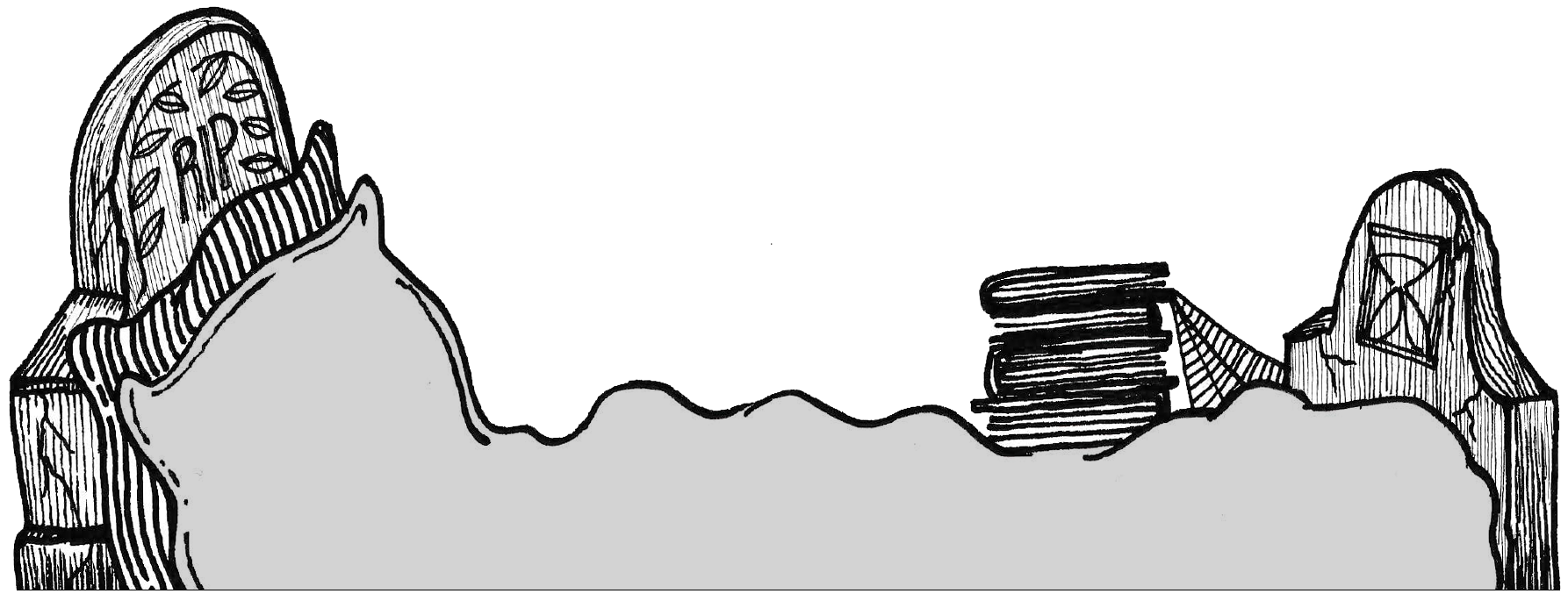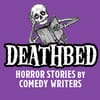The Monster Hunter Changes His Mind
Monsters. Mayhem. Metaphor.


“He sees the monsters as metaphors.”
The skin above the apprentice’s eyebrows creased. “The monsters…”
“As metaphors. Yes.” The old man finished his ale, wiped some foam from the wandering curlicues of his moustache, then gestured toward the serving-woman for another.
The apprentice peered into his own mug, seeking further answers at the bottom. Then he shook his head, as if the effort of bending his mind around the old man’s words required a physical release. “And this… helps him kill these demons?”
The old man glanced toward a finely carved cuckoo clock on the wall. It was growing late. Too late. But understanding required explanation. So the old man drew breath.
“Monsters, demons, creatures of the night – however we perceive or name them – all draw their power from our human fears. Specific fears. You ask me what made him the greatest monster hunter of them all, how he delivered countless innocents from darkness? Simply this: from birth Von Brandt could literally see the metaphors, the human frailties and fears that powered these wraiths. Armed with knowledge, he could rob them of their power.”
The old man turned to accept another stein of beer, and lingered in the transaction, distracted by the mountainous cleavage encouraged by the serving girl’s tight dirndl. The interruption tripled the boy’s frustration. None of this made sense. He’d traveled far to learn from Herr Lehrer, an intimate of the great Von Brandt, monster killer, hunter of the hunters. He’d expected to learn of charmed axes with mystic runes, herbs to drive off infernal beasts and healing poultices to combat their cursed wounds, ancient secret words to banish their spirits. But this?
This all seemed so… metaphysical.
He gathered himself high in his seat. “I’d rather have my crossbow and my silver knife to protect me than these… metaphors.”
The old man regarded him, mildly, from milky, hooded eyes. “Then I’m sure you’d be quite happy, right up until you died.”
The apprentice deflated. What was it his former master had encouraged, when understanding failed him? “Perhaps…” haltingly, he ventured, “I need an example.”
The old man leaned over the table. “Gladly.” He took a long pull of his drink, to wet his throat for the tale. “For example: the werewolf. Von Brandt’s special sight allowed him to discern the werewolf’s metaphor, meaning… its power – was simply a man’s battle with his own bestial nature. The fear of the monster within us all, and the damage we might unleash, should we indulge our animal instincts.”
The apprentice pondered the elder’s words. When laid out thus, they made sense. And yet… “But these are words. Philosophies. Not action. What did Von Brandt actually do?”
The man nodded. If the boy was impatient, at least he asked the right questions. “He made himself immune.”
The boy’s tongue looked poised to leap from his mouth with queries, but the old man raised a gnarled hand. “He studied with monks, both here and from the far east, to bring his lower and higher natures into alignment. He became fully unified, with no nature ascendent over the other. Once whole, the bite of a werewolf posed him no greater harm than that of any beast. And once protected…” The man lay his hands open on the table.
“He killed the werewolf?”
The old man nodded. “Slit his throat.”
The apprentice’s eyes danced. “With a silver dagger, like mine?”
The elder pursed his lips and glanced at the clock yet again. “Iron, I think. Iron cuts a man’s throat as well as silver, and more cheaply.”
Disappointment crumpled the younger man’s face. “He didn’t even slaughter him in wolf’s form?”
“You’d have Von Brandt wrestle a wolf? Quite dangerous, that. No, the business is best done when the cursed man’s snug in his bed.” The old man looked to the bar and gestured for another.
The apprentice slumped. What once sparkled for him seemed so dishonorable. Yet, perhaps it was different for other fiends – a comforting thought.
So he inquired. “And the bloodsucker? The wampyr? What is his metaphor?”
“Forbidden fruit. Sexual desire – the joys and fears it brings. The terror of intimacy. This is the metaphorical root of the vampire’s power.”
The boy blushed and shook his head, mystified. “But how is that dispelled?”
“To overcome the fear of sex, one must overcome shame.” He pushed aside an empty stein to make way for its replacement, and gave special emphasis to “sex” and “shame” for the benefit of the barmaid, who ignored him. “Von Brandt was once called to save a village from a very dangerous man – a nobleman afflicted by the curse of the nightbeast, who ruled over them and fed on their most comely youth. Von Brandt put a stop to that.”
“How?” asked the boy, transfixed.
“Fornication. A sustained policy of fornication.”
“I–” the apprentice began. “That’s–” he continued, before summing everything up with, “What?”
“He fornicated his way through the town. He thoroughly familiarized all the willing of sexual age with the erotic arts, via hands on experience, as well as charts and diagrams acquired in his travels to far-flung lands. He began with personal instruction, then the town broke off in various numbers and combinations for independent study. And once he’d put shame in its grave, Von Brandt willingly engaged in sexual congress with the vampire himself, before stabbing it through the heart at the moment of orgasm.” The old man set down his drink and lit a small pipe, before shrugging. “No one can hurt you like a lover.”
The apprentice sat in gobsmacked silence before raising his head, to venture, “Is it all sexual fear? Surely the vampiric metaphor is also the desire for everlasting life–”
“Yes, yes, yes.” The old man shook his match impatiently. “It’s all a rich tapestry. My point is, it worked! Not that the local church approved his methods.”
“I’m sorry if I seem impertinent,” the boy mumbled, cowed. “It just all seems seedier than I’d imagined.”
The old man bellowed, “You didn’t think killing was a seedy business?” His voice was harsh, but amusement flickered in his eyes. “Well, I suppose you’ll be happy to learn that murder isn’t always a necessity. Von Brandt once clashed with a prodigious witch, who terrorized her town for years until his arrival. Von Brandt knew a witch’s magic springs from the male fear of feminine power. Their need to suppress it. All he had to do was to integrate the witch into her community – a seat on the town council and a teaching position commensurate with her ability and intelligence…” The old man raised his hands, as if to say “Voila.”
The apprentice inflated himself, scandalized. “He let her live?!”
“No murder necessary. She and the town coexisted quite peacefully.” He puffed on his pipe, then added, “Well… until Von Brandt left. Free from his watchful eye, the city fathers demoted her. Couldn’t stand to give the witch her due. She burned down the whole place, of course. And I don’t particularly blame her.” He turned to yell meaningfully toward the barmaid, who now sat idly reading. “I, myself, have never had a problem with feminine power!” In response, she buried her nose deeper in her book.
The boy tried to regain his attention. “If Von Brandt was so powerful, then how did he die?”
The elder man turned round. “Who says he died?”
Taken aback, the apprentice cried. “Why, everyone. Across the land – everyone says it. Six years past, now. Death came for Alaric Von Brandt!”
“Yes, death came. Yet what is death but another monster? The one all others aspire to?”
The boy sputtered. “But death is not a metaphor. Death is just… death.”
“Wrong!” The old man slammed the table, causing an impressive collection of steins to leap and rattle. “Someone has not had their tarot read. Death is NOT just death. Death can also mean change! Change! A transition to something new! Von Brandt knew that very well!”
“But Herr Lehrer, you cannot fight with death. There is no winning!”
“Perhaps you are right. Even if you see all the moves, sometimes there is no winning.”
Somehow the old man’s agreement was more infuriating than his anger. The boy’s voice rose in pitch and volume. “I wish to fight evil, and you speak to me of…” he stood, as if searching the room for the words. “Literary theory!” The serving woman looked up from her book and smiled at the boy, who met her gaze, flushed. “I came here to be a great hunter of monsters! To follow in Von Brandt’s footsteps!”
Something unknowable shone in the old man’s eyes, and the boy stumbled backwards over his chair, unnerved. Then the cuckoo clock erupted, and though the cacophony lasted for twelve chirps, its serenade seemed to calm the older man. His eyes drifted to the blackness outside the window. The old man smiled dimly. Then he arose from the table. “Come. It’s past midnight. Time for one final lesson.”

Down deep, in the tavern cellar, rats skittered away as flickering light fell on them from above. The older man, Herr Lehrer, held a bare candle aloft as he guided the apprentice down the stairs to the soil floor below.
At the wall, he bid the apprentice to hold the candle, as he rolled aside a wide cask, to reveal a doorway in the stone wall. Beyond it, more stairs led even further down, descending to a short hall – and, at the end, a heavy iron door.
“I’ve been trying for six long years now to find the key to this one last riddle, but I’m afraid I don’t have my old friend’s gift,” the old man whispered, while straining to shift the heavy beam that barred the door. “Mayhap there are limits to what we can interpret and solve.”
With a final grunt, the beam hit the floor. “Still, for all our sakes, I hold out hope. Perhaps your young eyes will see what I cannot.” The door swung open, and the apprentice looked inside the room.
His eyes widened and his legs went slack. Within, a slouching thing turned toward him. If he’d known all the words in all the languages of all the lands, he could not have arranged them to describe what he saw. He could only say who it was not. What it was not.
It was not a man. It had changed.
The door clanged shut behind the apprentice, and he heard Herr Lehrer’s muffled voice call out. “Good luck. If you work out his metaphor, try to stay sane enough to tell me. I’d be quite curious to know it.”

About the Author
Dan McCoy was an Emmy and Peabody Award winning comedy writer for The Daily Show, and he created/co-hosts The Flop House podcast. As contributing editor to Deathbed, he wrote the story Bad Seed and devised the soon-to-be-globally renowned Deathbed Clown-o-Meter. If you just can't get enough of newsletters check out his other one.
Read more of Dan's Deathbed stories.
Image Credits
- "Bone" line breaks, original art by Becky Munich.


